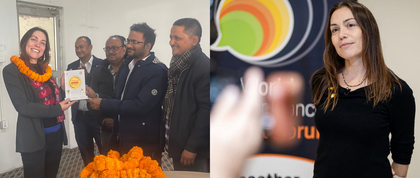
When Mélanie Samson came to NYU’s Washington Square campus she was already a lawyer by training, having earned her bachelor's degree in France, and her master's and doctorate in Switzerland. She was passionate about leveraging the law to promote global health, using intellectual property law to advance access to medicines, or human rights norms to advance quality of care.
It was during a postdoc residency at NYU Law, however, conducting research with a cohort of pioneers in global administrative law, that Melanie had an insight: The scientific authority underpinning global health standards can sometimes be even more impactful than the law itself. "What I was missing is the p-value," she explained, “using epidemiology and data to advance global health standards." As she reflected on the intersection of science and the law, it seemed only natural to enroll in GPH and bolster her skills. "It ticked all the boxes," she said.
Compared to lecture-based European schools, Melanie appreciated the interaction in her GPH classes. "What I love in the U.S. is that learners have a chance to contribute; we had the space to share our experiences. GPH was wonderful because people came from everywhere: myself, a lawyer from France, a philosophy graduate, doctors from all over the world ... so the exchanges among students and faculty were super interesting and engaging."
As an international student Mélanie found support from the Office of Global Services and GPH administrative staff. “New York might seem big at first, but it was quite easy to navigate, and the campus is the focal point of the neighborhood. I appreciated sharing tips with other students; making our way was more like a collective experience.” Melanie also keeps in touch with classmates and tracks her professors’ careers out in the field. “I see them when research is involved, and on social media; it’s a great network,” she said.
Melanie’s lessons in class were brought to life by her fieldwork. "We spent three or four weeks in Togo conducting research in remote areas for a community health organization, doing a formative evaluation of their program in maternal health. Our recommendations were then implemented and the project was ultimately adopted by the Ministry of Health to scale up across the region; I even published the qualitative data in a journal with one of my classmates. Then the CEO connected me with other qualitative researchers, and I did a study for them in Cote d'Ivoire. So it was great for networking, and a unique chance to get into the real world of global public health."
With her skills from GPH, Mélanie was ready for a more hands-on role promoting access to care. She returned to the Union for International Cancer Control, where she had worked briefly prior to NYU. "My MPH gave me the credential, the confidence and the experience to engage with the double profile of being a lawyer but also using monitoring and evaluation, or quantitative and qualitative methods, to implement public health projects directly. I do evidence-based advocacy, but rather than rely on someone else I now collect and analyze the data and use it to inform policies." Melanie has also been an expert for the International Agency for Atomic Energy’s cancer control planning programs in Sierra Leone and Burkina Faso.
After 10 years at UICC, improving access to medicine and cancer care globally, Mélanie was ready to explore a new facet of access: to surgical care for women. Eager to learn and contribute with her skills, she joined the Global Surgery Foundation last year as a senior technical officer to focus on three areas—access to safe C-sections, and to surgical care for breast cancer and cervical cancer in low-income countries. "I love doing project design, and my role is to implement projects," Melanie explained. "It's fascinating because it combines so many areas of public health, and I really like the technical aspects. You work with people to produce the best project possible."
In the future, Mélanie plans to live her passion for access to quality care, and to continue pursuing new paths. "I've been teaching global health law at Sciences Po in Paris for eight years," she noted. "Even now, we need to see with the fresh eyes of the students. It’s extremely enriching, and reflects the difference between the day-to-day work and the organizational perspective of implementing a project." Another dream would be to write books and articles on her interest in access to care. For now, though, Melanie’s focus is investing more in women's health and all gender-based approaches. "The important thing is to continue being open to new dimensions, so I'm trying to learn as much as possible regarding genders and a feminist interpretation of global health. I'm reading a lot, too, because rethinking global health and how we implement things is always interesting for me."